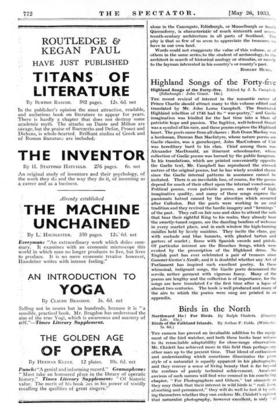Highland Songs of the Forty-five
Highland Songs of the Forty-five. Edited by J. L. Campbell. (Edinburgh : John Giant. 1138:) '
THE recent revival of interest in the romantic career of Prince Charlie should attract many to this volume edited and translated by tile. John Lorne Campbell. The 'frustrated Highland rebellion of 1745 had its " war'poetry;" and Gaelic imagination was kindled for the last time into a blaze of patriotic hope and passion. The fugitive, well-beloved Stuart was a symbol of his race, and these poems expiess the Highland -heart. The poets-canie from all classes : Rob Donn Mackay was si herdsnian, Duncan Ban Maclntyre, 'whose nature poems are Gaelic classics, was a gamekeeper, John MacCodrum of Uist was hereditary bard to his clan. Chief among them was Alexander MacDonald, in itinerant schoolmaster, whose collection of Gaelic poems was burned by the public hangman. In his translations, which are printed conveniently opposite the Gaelic text, Mr. Campbell has reproduced the stressed metres of the original poems, but he has wisely avoided rhyme since the Gaelic internal patterns in . assonance cannot be imitated. There is an inevitable loss, of course, for the poems depend for much of their effect upon the internal vowel-music. Political poems, even patriotic poems, are rarely of high imaginative quality, and many of these songs express the passionate hatred caused by the atrocities which occurred after Culloden. But the poets were working in an oral tradition and they revived the bardic imagery and "kennings" of the past. They call on fair seas and skies to attend the sails ; that bear their rightful King to his realin, they already hear the sweetly-tuned organs, see the dazzling bonfires of welcome in every market place, and in each window the high-burning candles held by loirely maidenS. ' They incite the clans, gay with cockade and blue bonnets, with pleated tartan and garters of scarlet ; fierce with Spanish swords and pistols. Of particular interest are the Breeches Songs, which were evoked by the proscription of the Highland dress. No English poet has ever celebrated a pair of trousers since Gammer Gurion's Needle, and it is doubtful whether any Act of 'Parliament has inspired such excellent poetry. In these whimsical, indignant songs, the Gaelic poets denounced the servile, nether garment with vigorous fancy. Many of the poems are lengthy and the collection is of importance, for the 'songs are here translated fir the :first. time after a lapse of
almost two centuries. The book is well produced and many of . the airs to which tile poeins were sung are printed in an appendix.
















































 Previous page
Previous page